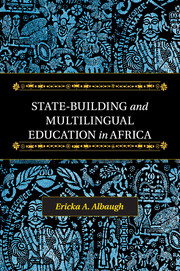Crossref Citations
This Book has been
cited by the following publications. This list is generated based on data provided by Crossref.
Buzasi, Katalin
2016.
Linguistic Situation in Twenty sub-Saharan African Countries: A Survey-based Approach.
African Studies,
Vol. 75,
Issue. 3,
p.
358.
LAITIN, DAVID D.
and
RAMACHANDRAN, RAJESH
2016.
Language Policy and Human Development.
American Political Science Review,
Vol. 110,
Issue. 3,
p.
457.
Liu, Amy H.
2016.
Democracy and minority language recognition: tyranny of the majority and the conditional effects of group size.
Democratization,
p.
1.
Bunyi, Grace
and
Schroeder, Leila
2016.
Bilingual and Multilingual Education.
p.
1.
Odugu, Desmond Ikenna
2017.
Re-thinking Postcolonial Education in Sub-Saharan Africa in the 21st Century.
p.
127.
Newman, Anneke
2017.
Négocier la réforme des écoles coraniques dans le nord du Sénégal.
Afrique contemporaine,
Vol. n° 257,
Issue. 1,
p.
57.
Bunyi, Grace
and
Schroeder, Leila
2017.
Bilingual and Multilingual Education.
p.
311.
Buzási, Katalin
and
Földvári, Péter
2018.
Language Policy and Linguistic Justice.
p.
287.
Liu, Amy H.
and
Pizzi, Elise
2018.
The Language of Economic Growth:A New Measure of Linguistic Heterogeneity.
British Journal of Political Science,
Vol. 48,
Issue. 4,
p.
953.
Gerring, John
Hoffman, Michael
and
Zarecki, Dominic
2018.
The Diverse Effects of Diversity on Democracy.
British Journal of Political Science,
Vol. 48,
Issue. 2,
p.
283.
Rhodes, Christopher
2019.
Evangelical violence: Western Christianity and the use of force against the Third World.
Third World Quarterly,
Vol. 40,
Issue. 2,
p.
224.
Lemberg, Diana
2019.
British and French Colonialism in Africa, Asia and the Middle East.
p.
297.
Odugu, Desmond I.
and
Lemieux, Camille N.
2019.
Transitional multilingual education policies in Africa: necessary compromise or strategic impediment?.
Language and Education,
Vol. 33,
Issue. 3,
p.
263.
Laitin, David D.
Ramachandran, Rajesh
and
Walter, Stephen L.
2019.
The Legacy of Colonial Language Policies and Their Impact on Student Learning: Evidence from an Experimental Program in Cameroon.
Economic Development and Cultural Change,
Vol. 68,
Issue. 1,
p.
239.
Dahlum, Sirianne
and
Wig, Tore
2019.
Educating Demonstrators: Education and Mass Protest in Africa.
Journal of Conflict Resolution,
Vol. 63,
Issue. 1,
p.
3.
Wijesekera, Harsha Dulari
Alford, Jennifer
and
Mu, Michael Guanglun
2019.
Forging inclusive practice in ethnically-segregated school systems: lessons from one multiethnic, bilingual education classroom in Sri Lanka.
International Journal of Inclusive Education,
Vol. 23,
Issue. 1,
p.
23.
Angrist, Michele Penner
2019.
Language Policy and Girls’ Education in Francophone West and Central Africa.
Social Politics: International Studies in Gender, State & Society,
Vol. 26,
Issue. 3,
p.
475.
Foote, Ellen
2020.
Sign Languages and Linguistic Citizenship.
p.
135.
Mneesha, Gellman
2020.
Mother tongue wont help you eat: Language politics in Sierra Leone.
African Journal of Political Science and International Relations,
Vol. 14,
Issue. 4,
p.
140.
Robertson, Sally-Ann
and
Graven, Mellony
2020.
Language as an including or excluding factor in mathematics teaching and learning.
Mathematics Education Research Journal,
Vol. 32,
Issue. 1,
p.
77.





